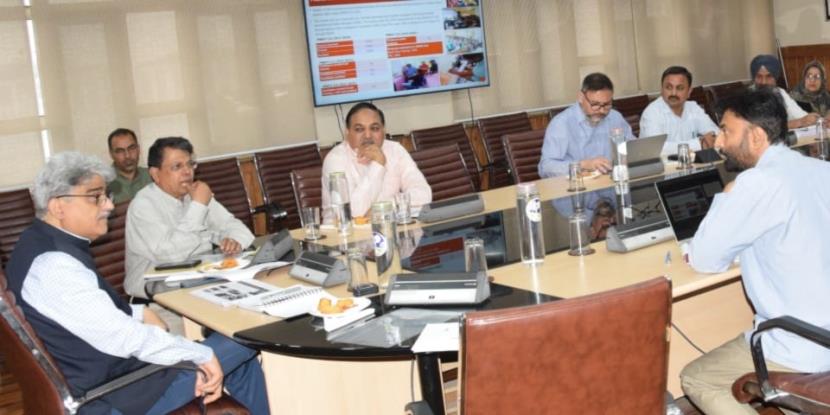SDD unveils HSDP for mega skilling of JK populace
CS lays emphasis on achieving set targets

Jun 17, 2025
SRINAGAR: Jammu and Kashmir is all set to embark on a transformative journey in skill development with the unveiling of Holistic Skill Development Plan (HSDP), a comprehensive strategy aimed at creating a future-ready workforce and fostering sustainable economic growth.
The plan was presented to Chief Secretary, Atal Dulloo, which outlines the ambitious goals and strategic interventions across various sectors.
Present on the occasion were ACS, Higher Education Department; Principal Secretary, School Education; Secretary, Skill Development Department (SDD); MD, Skill Development Mission besides Director, Skill Development along with other concerned officers.
The Chief Secretary emphasized that the true impact of the plan lies in its effective implementation at the grassroots level. He underscored the need for seamless coordination between the Education and Skill Development department, terming it essential for the plan's successful execution.
Highlighting the significance of skill development, Dulloo stated that it is a cornerstone for securing sustainable livelihoods for the people. He further noted that the National Education Policy (NEP) 2020 offers a clear roadmap to guide this transformative mission.
Reviewing the Department's progress under schemes like PM Vishwakarma and PMKVY, the Chief Secretary asked the officials to go beyond basic training. He stressed the importance of complimenting skill-building efforts with distribution of toolkits and access to credit linkages to truly empower the beneficiaries and enhance their livelihood opportunities.
ACS, Higher Education Department, Shantmanu, in his remarks, made out that a lot of transformative work had been done to link the education sector with the vocational courses to enhance employability of the students. He acknowledged that the department has a greater role to play in view of the objectives set under NEP-2020 and this skilling plan as well.
Principal Secretary, SED, Ram Niwas Sharma, also gave his inputs about the time bound implementation of the skilling plan besides ensuring about the seamless coordination with SDD in making the strategy to achieve these goals without facing any hindrance.
Secretary, SDD, Kumar Rajeev Ranjan, while highlighting the plan informed that J&K has strengthened its skilling infrastructure to a larger extent in the past few years. He revealed that there are currently 54 Government ITIs offering 71 trades with enrolment of 12,600 admissions taken against a capacity of 12,832 students. Similarly, the region has 22 Government Polytechnics offering 18 trades with an intake capacity of 3,275 students and corresponding enrolment of 3,200 admissions in 2024, he added.
The main focal point of this meeting was the discussion on the Holistic Skill Development Plan (HSDP) created by the department, envisioning empowerment of every individual with relevant skills, entrepreneurial mindset and livelihood opportunities, leading to sustainable employment and enterprise creation.
The plan delineates four tracks of skilling program-Skilling for School Explorer (Age 14-18) which focuses on early vocational exposure and foundational skills. This is followed by Skilling for Career Launch-Pad (Age 18-22) which envisages equipping the students with job-ready certifications and entrepreneurial orientation.
The 3rd path comprises of ‘Skilling for Job & Entrepreneurship Accelerator' (Age 22-35) enabling youth to choose between employment, entrepreneurship or competitive exams. The fourth one is ‘Skilling for Livelihood Enabler' (Age 35-59) which would support re-skilling for sustainable livelihoods and promote home-based/self employment.
The key challenges identified in HSDP implementation were set in the shape of the skilling ecosystem in J&K facing weak placement linkages, lack of upskilling pathways, limited access to skilling, poor delivery, outdated curriculum and lack of industry feedback.
The plan simultaneously proposed interventions propelled by the force of 4 E's engine constituting the Establish, Enrich, Execute and Empower strategy. The first engine aims at establishing institutional support by strengthening the J&K Skill Development Mission, industry engagements, district skill planning and establishing a J&K Skills University as a central hub with model ITIs/Polytechnics as nodes.
The Enrich part focuses on curriculum upgradation, aligning the training content with market demand. It also encompasses adopting model curricula, introducing priority sector tracks for new-age skills (AI, ML, Green Economy) and building 21st-century life skills and digital competencies. The Execute part focuses on efficient delivery by improving trainee mobilization, manpower management (trainer identification and capacity building), enhancing experiential learning through apprenticeships and dual system of training and providing structured offline placement support.
The whole strategy is envisaged to empower by building the enabling ecosystem throughout J&K. This pillar of the strategy also features developing the Mission YUVA App as a one-stop platform, implementing a Skills Passport system and facilitating the financing for skilling through loan schemes and vouchers.
Other focused initiatives constitute engaging Village-Level Skill Mitras/YUVA Saathis, who are trained volunteers at the Panchayat level to mobilize youth and link them with the schemes. For artisans and weavers, it envisions ‘Mission Artisan 2047', a dedicated vertical to preserve and modernize traditional crafts.
About the implementation, it was set out that the strategy will involve a multi-tier approach at Block, District and Divisional levels, ensuring convergence of UT and Centrally Sponsored Schemes.
The plan also emphasizes diverse training modes, including satellite campuses, online skilling, classroom training and mandatory on-the-job training.